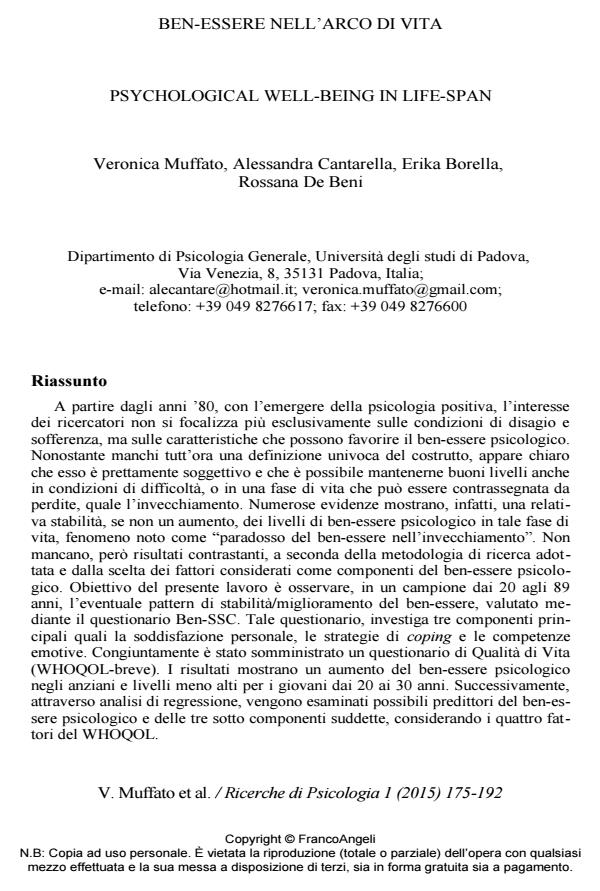Psychological well-being in life-span
Journal title RICERCHE DI PSICOLOGIA
Author/s Veronica Muffato, Alessandra Cantarella, Erika Borella, Rossana De Beni
Publishing Year 2015 Issue 2015/1
Language Italian Pages 18 P. 175-192 File size 286 KB
DOI 10.3280/RIP2015-001011
DOI is like a bar code for intellectual property: to have more infomation
click here
Below, you can see the article first page
If you want to buy this article in PDF format, you can do it, following the instructions to buy download credits

FrancoAngeli is member of Publishers International Linking Association, Inc (PILA), a not-for-profit association which run the CrossRef service enabling links to and from online scholarly content.
Since the 1980s, with the emergence of positive psychology, researchers have shifted their attention from psychological disorders to psychological wellbeing, also investigating variables that could enhance the latter. A clear definition of the construct is still lacking, but it seems possible to preserve appropriate levels of psychological wellbeing even in adverse conditions or in times of life that are often seen in a negative light, as in aging. Several studies have shown that wellbeing can be preserved, and even increase with aging, in what is called the "wellbeing paradox in aging". Results may diverge, however, depending on the study design used and on the aspects considered as components of the wellbeing construct. The aim of this study was to investigate the stability or variability of the levels of wellbeing in a sample of participants from 20 to 89 years old. The assessment was conducted using the Ben-SSC Questionnaire, which measures three key aspects, i.e. personal satisfaction, coping strategies, and emotional competences. Quality of life was assessed too, using the short version of the WHOQOL. Our results showed an improvement in psychological wellbeing with time, older adults reporting higher levels than adults from 20 to 30 years old. Possible predictors of psychological wellbeing (using the WHOQOL factors) were also investigated using regression analysis. Overall, our findings indicate that, contrary to negative stereotypes, suitable levels of wellbeing and quality of life can be preserved with aging.
Keywords: Well-being, aging, life-span, age-related differences.
- Stili educativi genitoriali, benessere scolastico e rendimento scolastico in adolescenza Maria Giulia Olivari, Eleonora Mascheroni, Gaia Cuccì, Emanuela Confalonieri, in RICERCHE DI PSICOLOGIA 1/2019 pp.9
DOI: 10.3280/RIP2019-001001
Veronica Muffato, Alessandra Cantarella, Erika Borella, Rossana De Beni, Ben-essere nell’arco di vita in "RICERCHE DI PSICOLOGIA " 1/2015, pp 175-192, DOI: 10.3280/RIP2015-001011